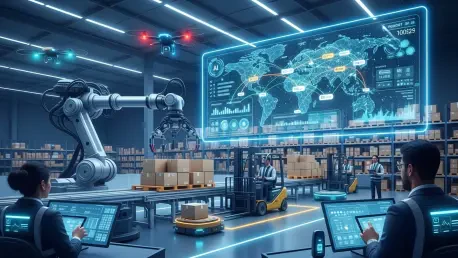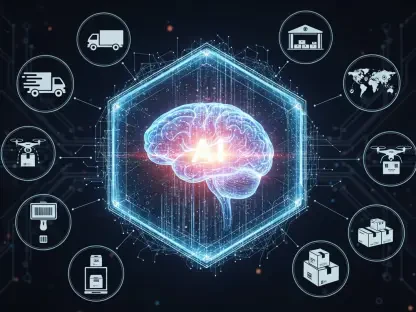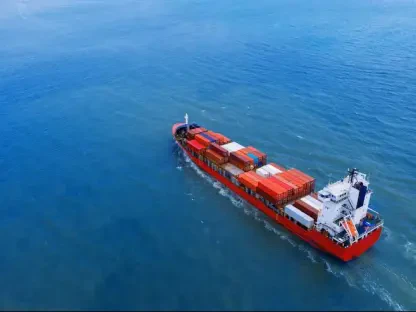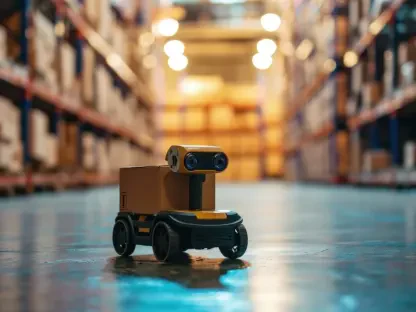What happens when a single delay at a border crossing costs a company thousands of dollars in lost revenue and time? In the high-stakes world of freight logistics, such disruptions are a daily reality, threatening efficiency and profitability. Yet, a transformative force is at play—Artificial Intelligence (AI) is stepping in to rewrite the rules of the game. Platforms like Transporeon are harnessing this technology to turn chaos into precision, offering solutions that promise to reshape how goods move across the globe. This feature dives deep into the impact of AI on freight logistics, spotlighting a leader in the field.
The Urgent Need for Innovation in Freight Logistics
Freight logistics operates in a pressure cooker of rising costs, global supply chain disruptions, and the relentless demand for faster, cheaper deliveries. Traditional approaches often buckle under these challenges, leaving companies vulnerable to unpredictable delays and inefficiencies. AI emerges as a critical tool, capable of processing massive datasets in real time to deliver actionable insights. With platforms like Transporeon leading the charge, the industry is witnessing a shift toward data-driven decision-making that prioritizes transparency and speed, addressing pain points that have long plagued transport management.
The significance of this transformation cannot be overstated. As supply chains grow more complex, the ability to predict and mitigate disruptions becomes a competitive edge. AI doesn’t just offer incremental improvements; it redefines what’s possible in logistics. By integrating cutting-edge technology, companies can save millions in operational costs while meeting customer expectations for reliability. This story of innovation is not just about tech—it’s about keeping the world’s economy moving.
AI-Driven Breakthroughs in Logistics Operations
Transporeon stands at the forefront of AI integration, tackling some of the most pressing issues in freight logistics with targeted solutions. One standout feature is enhanced visibility through real-time data. By leveraging Trimble’s mapping technology, live border status maps track half a million trucks daily, predicting delays and refining estimated times of arrival (ETAs). Shippers can now adjust plans proactively, sidestepping costly setbacks with unprecedented accuracy.
Another game-changer is operational efficiency through automation. AI-driven autonomous procurement optimizes routes and delivery schedules, slashing expenses and reducing idle time for fleets. This shift allows staff to pivot from repetitive manual tasks to strategic roles, boosting productivity across the board. The ripple effect is clear: streamlined operations translate to significant savings and improved service delivery.
Beyond efficiency, AI fosters smarter decision-making through market insights. Transporeon’s neutral platform delivers unbiased data on transport costs and trends via tools like Market Insights. This empowers businesses to allocate fleets profitably, staying ahead in a volatile market. Additionally, AI strengthens trust by aiding fraud detection, verifying documents and identities to minimize risks in the supply chain. These advancements collectively redefine how logistics players navigate challenges, proving that technology can drive measurable impact.
Voices from the Field: Expert and Customer Perspectives
Bernhard Schmaldienst, Director of Operations at Transporeon, offers a candid take on AI’s role in logistics. “Bad processes with AI are still bad processes,” he warns, emphasizing that technology amplifies existing flaws if systems aren’t robust. His insight underscores a critical truth: AI’s success hinges on strong foundational practices, a perspective that resonates with industry leaders seeking sustainable innovation.
Complementing this technical viewpoint is a real-world success story from Dimitar Vukov of Discordia, a customer leveraging Transporeon’s tools. By utilizing Market Insights, Discordia achieved real-time pricing adjustments and optimized fleet usage, directly enhancing profitability. Vukov’s experience highlights how AI translates into tangible gains, bridging the gap between complex algorithms and practical business outcomes. Together, these voices paint a balanced picture—AI holds immense potential, but its value lies in thoughtful application paired with human oversight.
Strategies for Adopting AI in Freight Operations
For companies eager to embrace AI through platforms like Transporeon, a deliberate approach is essential. Begin by auditing current processes to ensure they are streamlined; technology cannot fix inherent inefficiencies. Weak systems must be addressed first to avoid compounding errors through automation, setting a solid base for integration.
Next, focus on visibility tools to tackle delay-prone segments of the supply chain. Live border status maps, for instance, provide real-time data to enable proactive adjustments, minimizing disruptions. Simultaneously, adopting automation for tasks like procurement and routing can free up teams to concentrate on higher-value work, enhancing overall efficiency. Pair this with robust cybersecurity measures to protect against fraud and breaches as digital reliance grows, ensuring trust across networks.
Lastly, leverage market trend data to navigate fluctuating conditions. Insights into transport costs can guide decisions between contracted and spot services, maintaining agility. By aligning these strategies with tailored AI solutions, businesses can balance technological advancements with human expertise, unlocking the full potential of logistics innovation.
Reflecting on a Tech-Driven Transformation
Looking back, the journey of AI in freight logistics revealed a landscape reshaped by precision and foresight. What once seemed an insurmountable challenge—unpredictable delays and inefficiencies—became a solvable puzzle through intelligent systems. Transporeon’s role in this shift stood out, demonstrating how targeted tools could empower an industry to thrive amid complexity.
Moving forward, the path demands continued vigilance. Businesses must prioritize strong processes and cybersecurity as they scale AI adoption, ensuring technology serves as a partner rather than a liability. Exploring partnerships and data-driven insights will be key to staying competitive. As the logistics sector evolves, the focus should remain on blending innovation with human judgment, paving the way for a future where efficiency and reliability define global trade.









